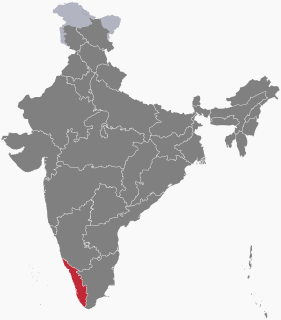
Malayalam is a Dravidian language spoken in the Indian state of Kerala and the union territories of Lakshadweep and Puducherry by the Malayali people. It is one of 22 scheduled languages of India and is spoken by 2.88% of Indians. Malayalam has official language status in Kerala, Lakshadweep and Puducherry (Mahé), and is spoken by 34 million people worldwide. Malayalam is also spoken by linguistic minorities in the neighbouring states; with significant number of speakers in the Kodagu and Dakshina Kannada districts of Karnataka, and Nilgiris and Kanyakumari, districts of Tamil Nadu. Due to Malayali expatriates in the Persian Gulf, Malayalam is also widely spoken in the Gulf countries.

The Kingdom of Travancore (/ˈtrævənkɔːr/), also known as the Kingdom of Thiruvithamkoor, was an Indian kingdom from c. 1729 until 1949. It was ruled by the Travancore Royal Family from Padmanabhapuram, and later Thiruvananthapuram. At its zenith, the kingdom covered most of the modern-day Southern parts of Kerala, and the southernmost part of modern-day Tamil Nadu with the Thachudaya Kaimal's enclave of Irinjalakuda Koodalmanikyam temple in the neighbouring Kingdom of Cochin. However Tangasseri area of Kollam city and Anchuthengu near Attingal in Thiruvananthapuram district, those were British colonies, were parts of Malabar District until 30 June 1927, and Tirunelveli district from 1 July 1927 onwards. Travancore merged with the erstwhile princely state of Cochin to form Travancore-Cochin in 1950. The five Tamil-majority Taluks of Vilavancode, Kalkulam, Thovalai, Agastheeswaram, and Sengottai were transferred from Travancore-Cochin to Madras State in 1956. The Malayalam-speaking regions of the Travancore-Cochin merged with the Malabar District and the Kasaragod Taluk of South Canara district in Madras State to form the modern Malayalam-state of Kerala on 1 November 1956, according to the States Reorganisation Act, 1956 passed by the Government of India.
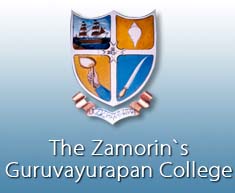
The Zamorin's Guruvayurappan College is an aided college in Kozhikode, Kerala, India offering graduation and post-graduation courses. It is affiliated to the University of Calicut.

Travancore–Cochin, or Thiru–Kochi, was a short-lived state of India (1949–1956). It was originally called United State of Travancore and Cochin following the merger of two former kingdoms, Travancore and Cochin on 1 July 1949. Its original capital was Thiruvananthapuram. It was renamed State of Travancore–Cochin in January 1950. Travancore merged with erstwhile princely state of Cochin to form Travancore–Cochin in 1950. The five Tamil-majority Taluks of Vilavancode, Kalkulam, Thovalai, Agastheeswaram, and Sengottai were transferred from Travancore-Cochin to Madras State in 1956. The Malayalam-speaking regions of the Travancore–Cochin merged with the Malabar District and the Kasaragod Taluk of South Canara district in Madras State to form the modern Malayalam-state of Kerala on 1 November 1956, according to the States Reorganisation Act, 1956 passed by the Government of India.

Thunchaththu Ramanujan Ezhuthachan was a Malayalam devotional poet, translator and linguist from Kerala, south India. He has been called the "Father of Modern Malayalam", or, alternatively, the "Father of Malayalam Literature", or the "Primal Poet in Malayalam". He was one of the pioneers of a major shift in Kerala literary production. The number and circulation of his texts far outdo that of any other poet of premodern Kerala.
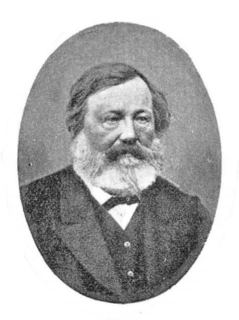
Hermann Gundert was a German missionary, scholar, and linguist, as well as the maternal grandfather of German novelist and Nobel laureate Hermann Hesse. Gundert is chiefly known for his contributions as an Indologist, and compiled a Malayalam grammar book, Malayalabhaasha Vyakaranam (1859), in which he developed and constricted the grammar spoken by the Malayalis, nowadays; a Malayalam-English dictionary (1872), and contributed to work on Bible translations into Malayalam. He worked primarily at Thalassery on the Malabar coast, in Kerala, India. Gundert also contributed to the fields of history, geography and astronomy.

Thiruvananthapuram District, is the southernmost district in the Indian state of Kerala. The district was created in 1949, with its headquarters in the city of Thiruvananthapuram, which is also Kerala's capital. It is also the IT capital of the State. The present district was created in 1956 by separating the four southernmost Taluks of the erstwhile district to form Kanyakumari district. The district is home to more than 9% of total population of the state.

Dr. Ambedkar Government Law College, commonly known by its former name Madras Law College, is a law school, located in Chennai (Madras), Tamil Nadu, India. It is also referred to as Government Law College or GLC, Chennai. It was established in 1891. It was renamed in 1990, as Dr. Ambedkar Government Law College, by the Government of Tamil Nadu in commemoration of the birth centenary of B. R. Ambedkar, the father of Indian constitution. In 1997, the Government of Tamil Nadu passed an Act which brought the college under the wings of the newly established Tamil Nadu Dr. Ambedkar Law University, splitting the college from the University of Madras. The college stands neglected ever since due to lack of funds and several internal politics.

St Thomas' College (Autonomous), Thrissur is a Government Aided college located in Thrissur City, the Cultural Capital of Kerala, India. Founded by Mar Adolph Medlycott in 1889, this college played a very important role in the development of the State. It is the oldest college in the erstwhile princely state of Cochin and present day Thrissur district. It is the second private college to be recognised as a first grade college under University of Madras, in then existed princely states of Travancore, Cochin and Malabar which later became mostly the present geographical area of Kerala. It is the first Catholic college in Kerala and is conducted by the Syro-Malabar Catholic Archdiocese of Thrissur. Mar Andrews Thazhath is the Patron and Mar Tony Neelankavil is the Manager of the College now.
The college is affiliated to University of Calicut. The College attained Autonomous status in 2014 and was recognised as College with Potential for Excellence by University Grants Commission in 2016. The College was awarded A Grade in its third cycle of reaccreditation by National Assessment and Accreditation Council (NAAC) after the peer team review in 2016.
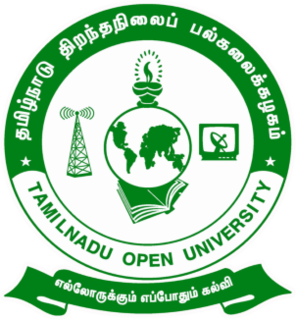
Tamil Nadu Open University (TNOU) is an Indian institution for open and distance learning established by the government of Tamil Nadu, India. It was founded in 2002 and is based in Chennai.
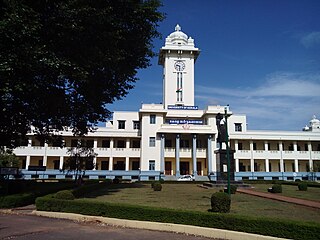
The importance and antiquity of education in Kerala is underscored by the state's ranking as among the most literate in the country. The educational transformation of Kerala was triggered by efforts of the Church Mission Society missionaries, who were the pioneers that promoted mass education in Kerala, in the early decades of the 19th century. The local dynastic precursors of modern-day Kerala—primarily the Travancore Royal Family, the Nair Service Society, Sree Narayana Dharma Paripalana Yogam and Muslim Educational Society (MES)—also made significant contributions to the progress on education in Kerala. Local schools were known by the general word kalaris, some of which taught martial arts, but other village schools run by Ezhuthachans were for imparting general education. Christian missionaries and British rule brought the modern school education system to Kerala.
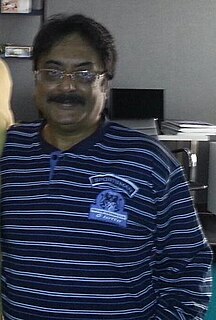
Pratap Pothen, is an Indian actor and filmmaker who has acted in about 100 films. He has acted in Malayalam, Tamil and Telugu as well as Hindi films.
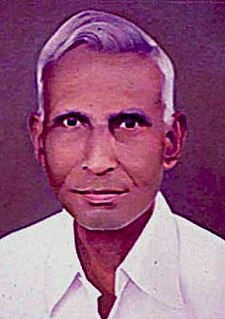
Kudiyirikkal Narayanan Ezhuthachan, commonly known as Dr.K.N.Ezhuthachan was an Indian writer and scholar of Malayalam literature. He was one among the principal followers of the idea of social impact on literature. Ezhuthachan supported Marxist literary criticism and interpreted Indian literary works based on Marxist aesthetics. He won the Sahitya Akademi Award for his work Keralodayam, a long narrative poem written in Sanskrit. He is the first Malayali to win Sahitya Akademi Award in sanskrit literature. He died on 28 October 1981 while delivering a lecture at Calicut University.
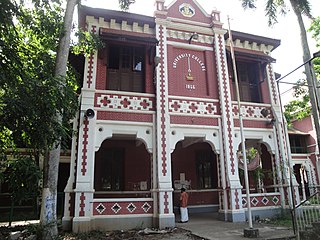
University College, Thiruvananthapuram (UCT) is a constituent college of the University of Kerala, based primarily in Thiruvananthapuram, the capital of the Indian state of Kerala. The college was awarded 23rd rank by National Institutional Ranking Framework, NIRF in 2019 and 2020.

Jalaja is an Indian actress in Malayalam films who was active during the 1970s and 1980s. She had won Kerala State Film Award for Best Actress and Filmfare Award for Best Actress in 1981 for the movie Venal directed by Lenin Rajendran.

Manamadurai Balakrishnan Sreenivasan, or MBS, as he was called, was a South Indian music director who worked mainly in the Malayalam and Tamil film industries.
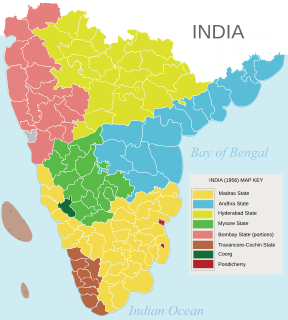
Madras State was a state of India during the mid-20th century. At the time of its formation in 1950, it included the whole of present-day Tamil Nadu, Coastal Andhra, Rayalaseema, the Malabar region of North and central Kerala, and Bellary, South Canara. Coastal Andhra and Rayalaseema were separated to form Andhra State in 1953, while South Canara and Bellary districts were merged with Mysore State, and Malabar District with the State of Travancore-Cochin to form Kerala in 1956. Post State Reorganization in 1956, the remaining Madras State was renamed to Tamil Nadu, meaning "Tamil country" on January 14, 1969.

Bishop Hodges Higher Secondary School', is under C.S.I. Madhya Kerala Diocese in Alleppey District. The school is located at the heart of Mavelikara town.

Rao Sahib Ayathan Gopalan, popularly known as "Darsarji"and "Darsar Sahib" ("doctor"), was an Indian physician, writer, philanthropist, social reformer, and Renaissance leader of Kerala. He is the founder of the Sugunavardhini movement and a leader and propagandist of Brahmo Samaj in Kerala. He denounced idol worship and fought to end those social practices in Kerala that he thought were unethical. Among his followers were Brahmananda Swami Sivayogi, Vaghbatananda, and Brahmavadhi P. Kunhiraman. Gopalan titled P. Kunhiraman as "Brahmavadhi" and Sivayogi as "Brahmananda Swami".

Malaysian Malayalees, also known as Malayalee Malaysians, are people of Malayali descent who were born in or immigrated to Malaysia from the Malayalam speaking regions of Kerala. They are the second largest Indian ethnic group, making up more than 15% of the Malaysian Indian population. The bulk of Malaysian Malayali migration began during the British Raj, when Britain facilitated the migration of Indian workers to work in plantations but unlike the majority Tamils, the vast majority of the Malayalis were recruited as supervisors in the oil palm estates which followed the Kangani system and some were into trading and small businesses with a significant proportion of them running groceries or restaurants. Over 90 percent of the Malayalee population in Malaysia are Malaysian Citizens.



















